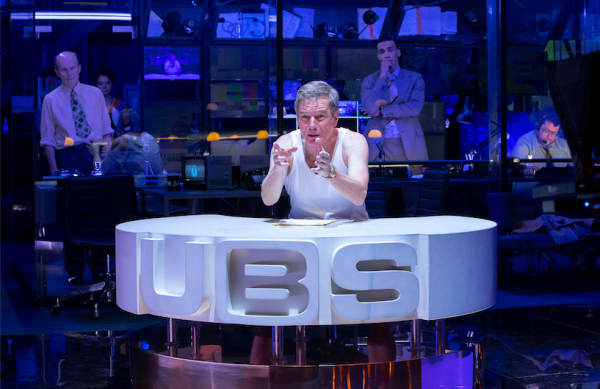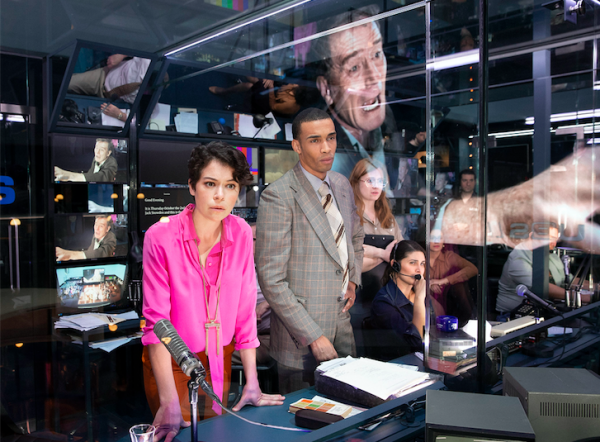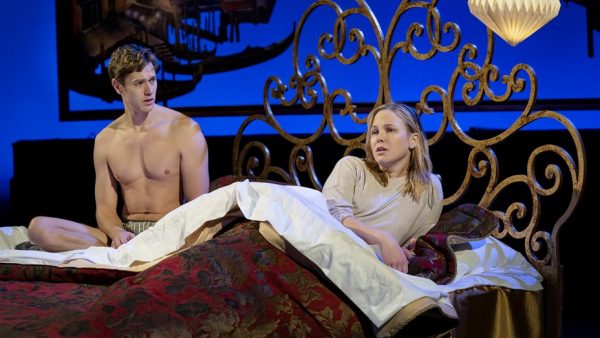When the film Network was released in 1976, legendary screenwriter Paddy Chayefsky’s wild portrait of an America saturated by media was seen as an hilarious fantasy. Now as internationally acclaimed director Ivo van Hove’s stage version opens on Broadway after a smash run in London, the vision of a dumbed-down populace hypnotized by their screens seems tame in comparison to the reality of 2018. In another frightening parallel to our dystopian present, deranged anchorman Howard Beale (played by Oscar winner Peter Finch in the movie) awoke the senseless rage of his viewing audience with the now familiar catch phrase “I’m as mad as hell and I’m not going to take it anymore.” Our reality-TV star president similarly touched a nerve of undirected anger and rode that wave into the White House, making this production terrifyingly relevant.

Credit: Jan Versweyveld
Lee Hall’s adaptation largely lifts Chayefsky’s screenplay with a few cuts—the terrorist group with its own TV hour has been downplayed. The true author of this inventive, involving piece of theater is van Hove who, along with his design partner Jan Versweyveld, has transformed the Belasco Theater into a world where video, stage, audience, and actors overlap and intermingle. Video screens are everywhere. An onstage restaurant provides meals for theatergoers as well as settings for the characters. The lines between TV and reality blur as when Beale and his news producer Max have a scene together at the corner of the stage. Their backs are to the audience, but their images are televised on a gigantic screen so that we are relating to their video avatars rather than the flesh-and-blood actors. The medium becomes the message as images supersede and dwarf the actual. It’s arresting, dazzling theater and a frightening message of dehumanization in the age of 24-7 streaming.
Occasionally, the staging gets a bit gimmicky and lessens Chayefsky’s theme of the deadening force of TV. This occurs when Bryan Cranston’s edgy and unpredictable Beale wades into the audience to deliver a chilling message of hopelessness amid corporate tyranny. Cranston jokes with the first few rows as he sits amongst them and suddenly we’re at a fun Broadway show instead of a devastating nightmare. Fortunately, there are few of these jolting slips.
Cranston gives a titanic rendition of the mad anchorman, rooted in logic and compassion, yet tinged with insanity. When he implores Beale’s viewers to rage, there is a true human connection. He really wants to save them from the despair of modern society, but we can see the deranged intensity lurking beneath his railing. Tony Goldwyn has the less showy role of Max Schumacher, representing stability in an insane universe and he provides the foundation from which van Hove and Cranston can take off on their flights of excess and nuttiness. Tatiana Maslany is the soulless programmer Diana Christensen (played by an Oscar-winning Faye Dunaway in the film) who twists Max’s news show into an entertainment spectacle. She captures Diana’s narcissistic ambition and charisma without making her into a harpy. It’s understandable why Max would launch an affair with her (depicted in graphic onstage detail in a breathtaking sequence which begins outside the theater and ends in the onstage eatery.) Alyssa Bresnahan is moving in the tiny role of Max’s wife (Beatrice Straight took the Best Supporting Actress Academy Award for the original) and Nick Wyman is icily effective as the financial giant who gives Beale the lowdown on who’s really running the show.

Credit: Jan Versweyveld
Von Hove has previously taken classic American plays such as A View from the Bridge, The Little Foxes, The Crucible, and A Streetcar Named Desire, stripped them down and turned them inside out, giving new takes on classic views of our country. Here he creates a sense-stunning, funhouse mirror reflecting the bizarre world where truth is stranger than satire.
Network confronts us with the dire implications of endless TV, but Tom Stoppard’s new play The Hard Problem, at Lincoln Center’s Mitzi Newhouse Theatre, asks us to consider the even deeper question of human consciousness itself. In a sleek production from Jack O’Brien, this intimate, yet infinite comedy-drama tackles the imponderable issues of God, man, good, evil, computers, art, and altruism in less than two hours without a break. For Stoppard, Britain’s most complex and brilliant playwright for almost six decades, this is a mere bagatelle of a play, but it’s an intellectual feast compared to the weightiest works of others.

Credit: Paul Kolnik
Scientist Hilary (a delightfully earnest Adelaide Clemens) and her sometime lover Spike (appropriately snarky Chris O’Shea) spar over whether the human brain can be recreated as a machine and if we are nothing more than a set of impulses. Hilary argues for the existence of God and the possibility of goodness, while Spike sees us as mechanical—a thermostat could have consciousness if properly programmed he opines. When Hilary launches an experiment to conclusively prove people are basically charitable and kind, a web of coincidences and interrelations is revealed and indirectly proves her thesis. As per any work from the author of The Real Thing, Arcadia and The Coast of Utopia, the talk is brilliant, witty, and thought-provoking. O’Brien’s staging is brisk and precise. In an interesting move, the director has the understudies change the furnishings in David Rockwell’s simple set and watch each of the many scenes like students at a grad seminar. At first this seems annoying and pretentious, but it later ties in with the theme of interconnectedness in this fascinating gem of a play.
Network: Dec. 6—April 28. Belasco Theatre, 111 W. 44th St., NYC. Wed 2pm & 7pm, Thu—Fri 7pm, Sat 2pm & 7pm, Sun 3pm. Running time: two hours with no intermission. $49—$399. (212) 239-6200. www.telecharge.com.
The Hard Problem: Nov. 19—Jan. 6. Lincoln Center Theater at the Mitzi E. Newhouse Theatre, 150 W. 65th St., NYC. Tue 8pm, Wed 2pm & 8pm, Thu—Fri 8pm, Sat 2pm & 8pm, Sun 3pm. Running time: 100 minutes with no intermission. $92. (212) 239-6200. www.telecharge.com.
